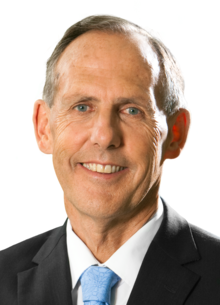Bob Brown | |
|---|---|
 | |
| Leader of the Australian Greens | |
| In office 28 November 2005 – 13 April 2012 | |
| Deputy | Christine Milne |
| Preceded by | No immediate predecessor |
| Succeeded by | Christine Milne |
| Leader of the Australian Greens in Tasmania | |
| In office 13 May 1992 – 13 March 1993 | |
| Deputy | Christine Milne |
| Preceded by | Party established |
| Succeeded by | Christine Milne |
| Senator for Tasmania | |
| In office 1 July 1996 – 15 June 2012 | |
| Succeeded by | Peter Whish-Wilson |
| Member of the Tasmanian Parliament for Denison | |
| In office 4 January 1983 – 12 February 1993 | |
| Preceded by | Norm Sanders |
| Succeeded by | Peg Putt |
| Personal details | |
| Born | Robert James Brown 27 December 1944 Oberon, New South Wales, Australia |
| Political party | Greens (since 1989) |
| Other political affiliations | Independent (until 1989) |
| Domestic partner | Paul Thomas |
| Residence(s) | Hobart, Tasmania, Australia |
| Education | Coffs Harbour High School Blacktown Boys High School |
| Alma mater | University of Sydney |
| Occupation | General practitioner (Self-employed) |
| Profession | Physician Politician |
| Website | bobbrown.org.au |
Robert James Brown (born 27 December 1944) is an Australian former politician, medical doctor and environmentalist. He was a senator and the parliamentary leader of the Australian Greens. Brown was elected to the Australian Senate on the Tasmanian Greens ticket, joining with sitting Greens Western Australia senator Dee Margetts to form the first group of Australian Greens senators following the 1996 federal election. He was re-elected in 2001 and in 2007. He was the first openly gay member of the Parliament of Australia and the first openly gay leader of an Australian political party.
While serving in the Tasmanian parliament, Brown successfully campaigned for a large increase in the protected wilderness areas. Brown led the Australian Greens from the party's foundation in 1992 until April 2012, a period in which polls grew to around 10% at state and federal levels (13.1% of the primary vote in 2010).[1] From 2002 to 2004, when minor parties held the balance of power in the Senate, Brown became a well-recognised politician. In October 2003 Brown was the subject of international media interest when he was suspended from the parliament for interjecting during an address by United States president George W. Bush.
On 13 April 2012, Brown resigned as leader of the Greens and indicated his intention to resign from the Senate in June. This occurred on 15 June 2012.[2][3]
- ^ "Election 2010 blog". Australian. 28 February 2011. Archived from the original on 4 May 2012. Retrieved 4 May 2012.
- ^ Ireland, Judith; Wright, Jessica (13 April 2012). "Bob Brown resigns as Greens leader and senator". The Sydney Morning Herald. Archived from the original on 27 October 2012. Retrieved 13 April 2012.
- ^ "Former Senator Bob Brown". Senators and Members of the Parliament of Australia. Retrieved 1 August 2022.